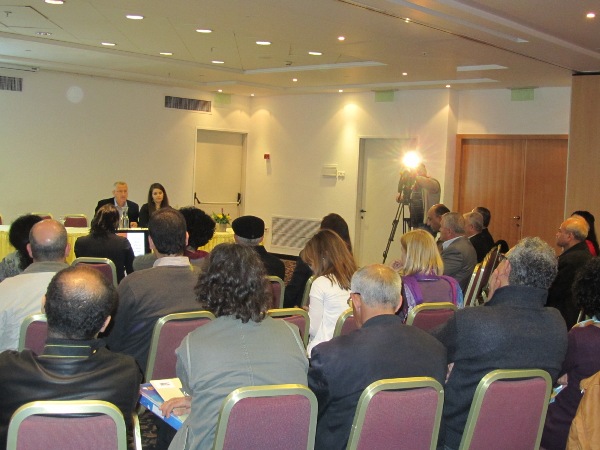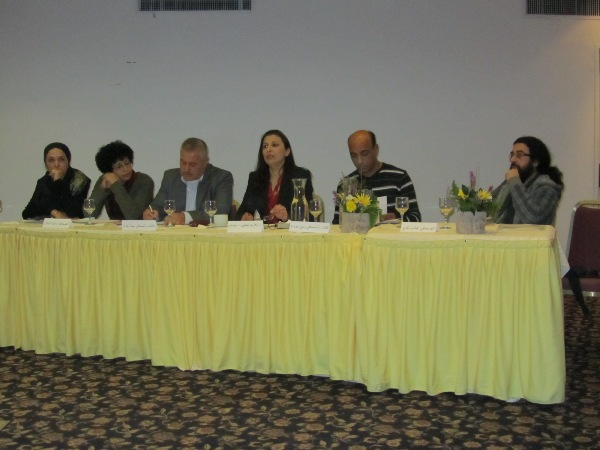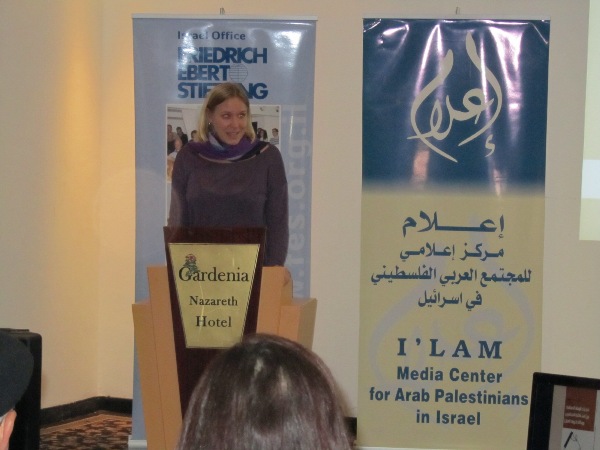I’lam’s colloquium held on Sunday 27 November presented its latest publication, entitled "The Challenges of Journalistic Professionalism: “Between Independence and Difficult Work Conditions”. The research was conducted by Dr.Amal Jamal and Rana Awaisi and is the first research of its kind mapping the professional difficulties and challenges that Palestinian journalists in Israel face. The research is based on interviews conducted with a random sample of 31 journalists. These journalists practice print and online journalism, broadcast and television journalism, and belong to the commercial/private media, party-affiliated media, governmental and foreign media.
Sanaa Watad, a member on I’lam Board and the colloquium's moderator opened the colloquium by welcoming the audience and affirming the important role played by I'lam Media Center in the Arab media sphere in the country. Afterword Ms Helene Kortlaender from Friedrich Ebert Stiftung foundation, the foundation supporting the research, welcomed the audience and expressed her satisfaction from I'lam’s activities for the second year in a row.
Afterword, Jamal and Awaisi revealed the research findings and suggested further recommendations. Jamal presented the methodology and hinted that journalists today are unable to perform to their full potential. Part of the problem is their lack of awareness of their role as leaders in society. He said that most of the journalists interviewed did not place responsibility for poor journalistic performance on the socio-economic conditions in the local Arab media, but instead blamed it on different sources. He continued: “We must work towards the professionalization of journalism and journalists and the education of a generation of readers”.
And to discuss the research and its findings, Dr. Taghreed Yehya-Younis, the writer and the journalist Suhail Kiwan, the journalist Mageda batsh, the writer and the journalist Wadea Awady and the journalist Hisham Nafaa were invited.According to Yehya-Younis, “As researchers and readers it's important for us to know what kind of responsibility we give to the journalists and it's important that the research is written in Arabic aimed at every Arabic reader”.Suhail Kiwan intervened: "The importance of this research lies in how it documents, based on oral testimony from journalists themselves, the status of our media. In spite of the problems the research underscores and the challenges we face, I would like to pay tribute to our media that in spite of it all is still a media characterized by relative freedom compared to other media spheres in the Arab world.
Further, we fulfill a crucial niche in reporting on our community that the Israeli and Arab media tend to ignore”. He said he was completely aware of the difficult economic situation that Arab journalists inside Israel face.
Journalist Magda Batsh of Agence France-Presse noted at the beginning of her speech that the press operating in Jerusalem is much more vulnerable to military censorship than those within Israel. Touching upon the relationship between the Arab community and the media, she noted: "Our society still has a clan mentality. If I write about Netanyahu I don't expect his family to come after me, whereas I do if I write against certain people in our community". As for the role of the press and its impact on society, she said:" Our people are an oral one so the written media still do not have the full impact because we tend to accept more what we hear than what we read". She also addressed the security constraints that influence journalistic work.
Wadea Awaady, writer and journalist and editor-in-chief in Hadeth An -Nas and editor on the Aljazeera website: "The research reflects the reality of the media which faces a very big crisis and needs to be fixed. Journalists are part of the problem of the media crisis and the owners also play a big role”. He mentioned that his obligation is to break the taboo and to challenge corruptions, racism and ignorance. He added, “We as journalists confront economic pressures from the owners but we should find other sources of income so that we can free ourselves from the owner's control; our journalists write but don’t read”.
The final spotlight was on Hisham Naffaa, writer and editor of al-Ittihad daily and Qadita newspaper, "I got warm feelings reading the research; finally there is someone who really cares about the journalists. We as journalists relate to the problems and the hindrances as individuals and this is the weakness, we must consider ourselves a responsible group. If we cannot gather the information and paint a picture as a collective then we should leave this profession. I read the citations about the journalists’ fears and it wasn't acceptable to me, it's natural to deal with threats and violence. And it's not professional for a journalist to say that s/he is “afraid”, a journalist should be responsible to deal with the ignorance that includes violence, weapons and other socials affairs".
He added: "Sometimes I have to be a journalist, an editor, a proofreader and even the photographer. This is not ‘normal’ but it is the reality of our profession. We should have our own journalists' council since the Israeli journalists' council doesn't represent us. I feel sorry about good journalists who left journalism because of difficult economic conditions. This is a crime against the media and that is why I think this research should aim at the media owners”. In the end, the speakers and the researchers responded to the audience's questions and comments.

Jamal and Awaisi revealing the research findings

The Speakers

Ms Helene Kortlaender from Friedrich Ebert Stiftung foundation, the foundation supporting the research.
|